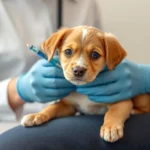
Recognizing if your dog is pregnant can be both an exciting and daunting experience for pet owners. Understanding the nuances of canine pregnancy is essential not only for the health of the mother but also for the well-being of her future puppies. The question, “is my dog pregnant?”, becomes a primary concern during this period. This article delves into the intricacies of dog pregnancy, providing insights on how to determine if your dog is pregnant, how to care for her during this time, and what to expect post-pregnancy.
Understanding Dog Pregnancy
What is Canine Pregnancy?
Canine pregnancy, or gestation, is a biological process that occurs when a female dog, or bitch, becomes pregnant after mating with a male dog. The gestation period for dogs typically lasts about 63 days, though it can vary by a few days depending on various factors. During this time, the developing embryos go through several stages, leading to the birth of healthy puppies.
Signs of Dog Pregnancy
Identifying the signs of pregnancy in dogs can be the first step in confirming whether your dog is expecting. Some common physical signs include:
- Weight Gain: As the pregnancy progresses, you may notice your dog gaining weight.
- Enlarged Abdomen: This can become more pronounced in the later stages of pregnancy.
- Nipple Changes: The nipples may become larger and darker.
- Change in Appetite: Some dogs may experience increased appetite, while others may eat less during early pregnancy.
In addition to physical signs, behavioral changes can also indicate pregnancy:
- Nesting Behavior: Many pregnant dogs will start to seek out quiet, comfortable places to prepare for the arrival of their puppies.
- Increased Affection: Your dog might become more affectionate than usual, seeking more attention and cuddles.
Factors Influencing Dog Pregnancy
Several factors can influence the likelihood and health of a dog’s pregnancy:
- Age and Health of the Dog: Younger dogs and those in good health are generally more likely to have healthy pregnancies. Older dogs may face more complications.
- Breed-Specific Considerations: Certain breeds may have different gestation lengths and litter sizes. For example, smaller breeds may have smaller litters, while larger breeds may have larger litters.
How to Determine if Your Dog is Pregnant
Home Pregnancy Tests for Dogs
If you suspect your dog might be pregnant, there are at-home pregnancy tests available that can help you confirm your suspicions. These tests typically work by detecting the presence of relaxin, a hormone produced during pregnancy.
Pros:
– Convenient and easy to use.
– Can provide results quickly.
Cons:
– Accuracy can vary.
– May not detect pregnancy until several weeks in.
Veterinary Confirmation
While home tests can provide an initial indication, the most reliable way to confirm pregnancy is through a veterinary check-up. Veterinarians can employ several diagnostic methods:
- Ultrasound: This can be performed as early as 25 days into the pregnancy to confirm the presence of puppies.
- Blood Tests: A test for relaxin can provide confirmation of pregnancy.
- Physical Examination: A vet can sometimes feel the puppies by palpating the abdomen after about 28 days.
Timeline of Pregnancy Detection
To effectively monitor your dog’s pregnancy, start looking for signs as soon as you suspect she might be pregnant. Early detection is crucial for ensuring a healthy pregnancy. Regular veterinary check-ups are advisable every few weeks to monitor the health of both the mother and her developing puppies.
Caring for a Pregnant Dog
Nutritional Needs
Proper nutrition is critical during your dog’s pregnancy. A balanced diet will support both her health and the development of her puppies. You may need to adjust her diet to include:
- High-Quality Puppy Food: This is often richer in essential nutrients.
- Increased Caloric Intake: Pregnant dogs typically require more calories, especially in the last trimester.
- Supplements: Consult your veterinarian about necessary vitamins or minerals.
Veterinary Care
Regular veterinary care is essential throughout your dog’s pregnancy. This may include:
- Routine Check-Ups: To monitor the health of the mother and puppies.
- Vaccinations: Ensure your dog’s vaccinations are up to date before breeding.
- Prenatal Care: Discuss any concerns with a veterinarian to ensure that any potential issues are addressed promptly.
Preparing for Whelping (Giving Birth)
As your dog approaches her due date, it’s important to prepare for the birthing process. Consider setting up a whelping area, which should include:
- A Clean, Quiet Space: This should be away from household traffic.
- Whelping Box: A designated area where your dog can feel secure while giving birth.
- Supplies: Stock up on clean towels, gloves, and other birthing supplies recommended by your veterinarian.
Monitoring Dog Health During Pregnancy
Signs of Complications
It is important to monitor your dog for any signs of complications during her pregnancy. Warning signs to watch for include:
- Excessive Vomiting: While some nausea is normal, excessive vomiting can indicate a problem.
- Lethargy: If your dog seems unusually tired or inactive, it may be cause for concern.
- Discharge: Any abnormal discharge from the vulva should be reported to a vet immediately.
If you notice any of these signs, it’s crucial to seek veterinary assistance right away.
Physical Activity Recommendations
While exercise is important for pregnant dogs, it’s essential to tailor her activity to her condition. Recommendations include:
- Moderate Exercise: Short walks and gentle play can help maintain her health.
- Avoid Strenuous Activities: High-impact exercises or rough play can be harmful.
Post-Pregnancy Care
Caring for the Mother and Puppies
After giving birth, it’s vital to focus on the health of both the mother and her new puppies. Nutritional needs may change again, requiring:
- High-Quality Food: The mother will need nutrient-rich food to support nursing.
- Hydration: Ensure she has access to fresh water at all times.
Health Check for Newborns
The first few weeks after birth are crucial for the puppies’ development. Initial assessments should include:
- Weight Checks: Monitor the puppies’ weight to ensure they are feeding adequately.
- Vaccinations: Consult with your vet about when to begin vaccinations and what to look for regarding health issues in newborns.
Long-term Care for the Mother Dog
After whelping, the mother dog will require ongoing care. Important considerations include:
- Monitoring Her Health: Keep an eye on her eating habits and overall behavior.
- Spaying Considerations: Discuss with your veterinarian the best time to spay your dog if you do not plan to breed her again.
Conclusion
Understanding canine pregnancy is essential for responsible dog ownership. Recognizing the signs and knowing how to care for a pregnant dog can lead to healthier outcomes for both the mother and her puppies. If you are ever in doubt about your dog’s health or pregnancy status, consulting with a veterinarian is always the best course of action. Responsible dog care ensures a happy and healthy family, both for you and your furry companions.
The journey from “is my dog pregnant?” to welcoming adorable puppies into your home can be filled with joy, anticipation, and responsibility. With the right knowledge and preparation, you can navigate this exciting time with confidence.









